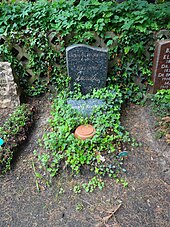Klaus Günter Neumann
Klaus Günter Neumann (born June 30, 1920 in Berlin ; † July 3, 1995 there ) was a German cabaret artist , actor, lyricist, composer , arranger and pianist . He is often mistaken for his colleague Günter Neumann by the islanders .
Life
Klaus-Günter Neumann was born in Berlin as the son of a tax officer. After graduating from high school, he began to study at the drama school of the Deutsches Theater Berlin , as well as private music training. He had to break off both when he was drafted into the Wehrmacht in 1939, where he ran a soldiers' theater. In 1942, while on vacation, he auditioned for Willi Schaeffers , who immediately offered him a job in the comedians' cabaret , which he was unable to take on because of the war. It wasn't until 1946 that he started playing his own chansons as a piano humorist and stayed there until 1950. In the meantime, in 1947 he opened his own cabaret, the Greifi Bar , the first post-war cabaret in Berlin. It was there that his first own revue, Die Luftbrücke , premiered in 1948 , which was followed by six more by 1951, all from his pen. Last festival , in which Wolfgang Müller appeared, whom Neumann knew from his time as a soldier in France. Also Brigitte Mira , Ethel Reschke , Ruth Stephan and Walter Gross played with him. In 1952 he moved into a new domicile on Nollendorfplatz , where he performed two more reviews.
In addition to his revue appearances, Neumann also worked as a buffo at the Berlin State Opera, as well as employees of various broadcasting companies. From 1951 to 1954 he appeared in the program Rund um die Berolina on the NWDR as the “piano mayor of Berlin” , an “honorary title” that Ernst Reuter had given him. He also wrote radio plays for the radio. After regular operations on German television began , he was involved as a composer, author and interpreter in the first live broadcast from the Berlin Sports Palace .
He was also successful as a hit writer. Together with Ernst Bader he wrote the text for “ Tulips from Amsterdam ”, which was set to music by Ralf Arnie , and as the composer “ Wunderland bei Nacht ”. This instrumental piece in the version by Bert Kaempfert became a number one hit in the USA under the title "Wonderland by Night" and got a platinum record in Germany. The LP of the song series Zille sein Berlin , sung by Peter René Körner , Edith Elsholtz , Bully Buhlan , Jo Herbst and by Neumann himself, was also successful . In the lyrics of these songs about Heinrich Zille and his time, he used many quotations from Zille's drawings.
Klaus Günter Neumann died just three days after his 75th birthday on July 3, 1995 in Berlin. His grave is on the state's own cemetery in Heerstraße in Berlin-Westend (grave location: 18-C-6).
Private
Neumann was married to Ilse Kiewiet . The marriage ended in divorce. He was a member of the SPD .
Revues
- In the Grifi Bar
- 1947: The airlift
- 1948: We're on the train again
- 1949: totoritis
- 1950: The mill rattles
- 1950: It has to be naked
- 1951: illusions
- 1951: Festival
- At Nollendorfplatz
- 1952: change of scenery
- 1953: The magic of the booth
Movie and TV
- 1951: From stone and earth (short film) (music)
- 1952: You Only Live Once (Actor)
- 1953: Budenzauber (TV film) (music)
- 1953: Dad Does Stupid (Actor)
- 1955: Father's Day (Actor)
- 1955: Central arrest for three days (actor)
- 1959: Our Wonderland by Night (music, actors)
Web links
- Literature by and about Klaus Günter Neumann in the catalog of the German National Library
- Klaus Günter Neumann in the Internet Movie Database (English)
- Klaus Günter Neumann at filmportal.de
- List of works: Neumann, Klaus Günter
Individual evidence
- ^ Munzinger biographies: Klaus-Günter Neumann
- ↑ DER SPIEGEL 2/1955: "Günter Neumann"
- ^ Foreword to the music edition of his song series "Zille - sein Berlin!" , Edition Cinevox Hans Gering oHG, Cologne 1981
- ↑ List of number one hits in the USA (1961)
- ↑ "Zille sein Berlin" at Discogs
- ^ Hans-Jürgen Mende : Lexicon of Berlin burial places . Pharus-Plan, Berlin 2018, ISBN 978-3-86514-206-1 . P. 492.
- ^ Piet Hein Honig, Hanns-Georg Rodek : 100001. The show business encyclopedia of the 20th century. Showbiz-Data-Verlag, Villingen-Schwenningen 1992, ISBN 3-929009-01-5 , p. 511.
| personal data | |
|---|---|
| SURNAME | Neumann, Klaus Günter |
| BRIEF DESCRIPTION | German cabaret artist, actor, lyricist, composer, arranger and pianist |
| DATE OF BIRTH | June 30, 1920 |
| PLACE OF BIRTH | Berlin |
| DATE OF DEATH | 3rd July 1995 |
| Place of death | Berlin |
